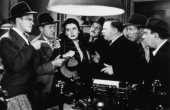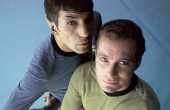KennethC
I have a bachelor's in history and communication. When I'm not pretending to be a Jedi Knight, I can be found reading, playing video games, and watching television and film.
Contributor I
- Lurker
- Pssst
- Hand Raiser
- Vocal
- Sharp-Eyed Citizen
- ?
- Articles
2 - Featured
1 - Comments
87
- Ext. Comments
62 - Processed
5 - Revisions
5
- Topics
4 - Topics Taken
0 - Notes
11
- Topics Proc.
7 - Topics Rev.
1
- Points
979 - Rank
131 - Score
555
Latest Articles
Latest Topics
Published | Why Reread Books?With so many books out there, why do many people keep going back to the same books and rereading them? Did they simply enjoy the book that much during their first reading, or is there more to it? Perhaps the book is being adapted into a film, and people want to jog their memory and reacquaint themselves with the story and characters. Maybe people love the world so much that they feel a great comfort and familiarity escaping to it when they reread the book. It might be a tradition to reread a particular story at a certain time of year, like Charles Dickens' A Christmas Carol. It is also possible that the readers did not fully appreciate or understand the book the first time through, or, quite oppositely, fully understood it and want to experience the book again now that they know all the twists and turns the author has to throw at them. Why do you think people reread books? What value does rereading the same books have when there are so many other new stories out there waiting to be uncovered?
|
Is Competitive Video Gaming a Sport?E-sports have been growing in popularity in recent years. Under branches like Major League Gaming (MLG), competitive video game tournaments fill entire arenas and are broadcast complete with play-by-play and color commentary. Its players compete for major prize money. Outlets like ESPN now dedicate reporting coverage to e-sports. Top video game players even have exercise routines and diets to ensure they remain at the top of their game. Many of them consider themselves to be just as much an athlete as any traditional professional athlete in sports such as baseball. However, well-known sports analysts regularly laugh in the face of this kind of thinking. Is competitive video gaming a sport? What qualifications must an activity meet to be considered a sport?
|
Should Showrunners Direct Every Episode of Their Shows?More and more television showrunners are pulling double duty as directors of their shows, foregoing the practice of bringing in guest directors. Alec Berg and Mike Judge alternated writing and directing episodes of season two of Silicon Valley. Sam Esmail took over directing duties for the second season of Mr. Robot. Does the lack of guest directors help or hurt a show's quality?
|
In Defense of Anime Filler EpisodesAlmost all of the big anime shows (e.g. One Piece, Bleach, and Naruto) have filler episodes. These filler episodes are met with groans from many fans, especially those who also read the original manga that these shows are based on. Most of the time, these filler episodes are made without any input from the original creator of the source material. Lots of fans will simply skip these filler episodes and jump ahead to the episodes where the canon story resumes. For this topic, the author will argue in defense of these filler episodes and attempt to point out their merits. Do any filler arcs from certain anime stand out as quality content despite not being canon? Why shouldn't fans be so quick to dismiss filler content?
|
Latest Comments
| Dystopia: Hope in the Face of a Seemingly Impenetrable System | |
Great examples and great article! | Sensitive Topics in Recent Disney Films |
Great article! Now please excuse me while I go prepare something to eat for lunch. | Life Lessons from Literature About Food |
Last season was pretty awful. It felt like a chore to watch, like the joy had been sucked out of the viewing experience. I watched the new season premiere this past weekend just because I feel like I have to stick it out to the end at this point since I’ve been watching from the very beginning, and I was happily surprised. I’m excited to see what the new showrunner has in store for us now that Gimple is out of the picture. | The Walking Dead: What Led To Its Jeopardy |
Wow, what an extensively well put together article! Very interesting selections for each category to be sure. Couldn’t you condense the religion section since the Torah is contained in the Bible? | Rebuilding The Future: What book would you bring? |
Thank you for this article. Shoutout to Lady Lyanna Mormont! | Why do the Women of Game of Thrones Suffer So Much? |
Who else is excited to have the Clone Wars back for one final season? We may see more of Maul yet! | Darth Maul: A Triumph of the Star Wars Extended Universe |
I think another reason the soundtrack was so popular was the collaboration with Lin-Manuel Miranda. Disney really seemed to make an effort to immerse itself in the culture for this film, like Pixar did with Coco. | Moana: A Disney Princess For The 21st Century |


Love a good dystopian story! Out of the ones you mentioned, Fahrenheit 451 is my favorite.